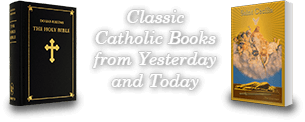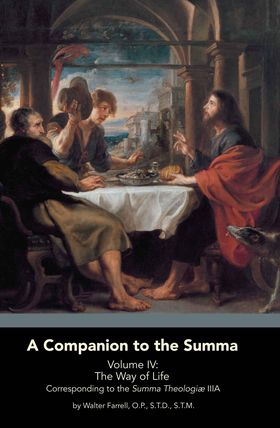Categories
Information
Fr. Walter Farrell, O. P. - Hardcover 430 pages
Order the 4 volume set here!
Volume Four
St. Thomas died too soon to finish his book, the Summa Theologica. Not all authors are so fortunate. This book marks the completion of a series, projected long ago perhaps with an eye to Thomas’ good fortune. The first was a search for the ultimate answers that form the bedrock of human life, human action, and the living of human life; the second furnished the key to human life and human action; the third concentrated on the living of human life in all its exuberant fullness; this, the fourth, traces the royal road a man’s feet must walk and the goals that await him at the end of the journey.
It was the Son of God Who declared. “I am the way”; this book takes His words literally, as they were meant to be taken. Its subject matter, then, is the sublime mystery by which the Son of God became man to lead men to God, the mystery of the Incarnation. It does not stop at an examination of the mystery but goes on to trace all the consequences of God’s dwelling among men: the life of Christ, detail by detail; His blessed mother; the continuation of His life in the sacraments; and the goal of heaven which is at the end of the royal road, the goal of hell which is the terminal of any other path. From beginning to end, this book deals with the supernatural, and that without apology, excuse, or defense; all this has been taken care of in previous volumes. Its contents are thus not so much an argued thesis as a divinely stated fact. If a modern reader is avid of facts, he will find a sublime diet of divine facts here; if, however, he is fastidious in the matter of facts, particularly supernatural facts, this diet may well prove too much for him.
It was not, however, for the fastidious, but for those who were hungry for God that these books were written. If they do something to stave off starvation from those who have the courage to admit their hunger, Thomas may be pardoned for not having seen to it that they were not finished, and I may be forgiven for the effrontery that began them.
Again, I wish to express my gratitude to Thomas for the good things in these books, and to my critics that the bad things are not worse.
About the Author
Father Farrell’s four-part Companion to the Summa has been responsible for much of the renewed interest in Thomism in the United States. It is required reading for many Catholic college students and “unrequired reading” for thousands of other lovers of St. Thomas.
Its author was born in Chicago in 1902. He attended Dominican schools and was ordained in the Dominican order in 1927, then going to the University of Fribourg for his S.T.D. degree. In 1940 he was awarded the seldom given Dominican honor of the Master of Sacred Theology degree. He served as a Navy chaplain during World War II and was then stationed at the Dominican Houses of Studies in Washington, D. C. and River Forest, Illinois until his death in 1951.
A Word About Loreto Publications
All publishing houses have some overarching principles that guide the choice of which books they publish and promote (unless they be primarily interested in monetary gain, in which case they are of no account) and according to which they base their operations and choices.
Loreto’s foundation is based upon a specific set of Catholic principles and a school of thought that developed around a religious order founded in 1949 in Cambridge Massachusetts, the Slaves of the Immaculate Heart of Mary. At the heart of their spirituality lies two essential pursuits, the pursuit of wisdom as described by their philosopher Br. Francis Maluf, M.I.C.M. —“Wisdom is the most perfect knowledge of the most important truths in the right order of emphasis, accompanied by a total, permanent disposition to live accordingly.”—and a fervent desire to train up an army of apostles to convert our beloved nation to the Catholic religion.
The spiritual and intellectual life of these ardent Slaves developed by being steeped in the works of people such as Cornelius aLapidé, Dom Gueranger, St. John Eudes, St. Louis Marie deMontfort, Bl. Dom Marmion, St. Maximilian Kolbe, St. Alphonsus Maria deLiguori, and the Fathers and Doctors of the Church, especially St. John Chrysostom, St. Augustine, and St. Thomas Aquinas. Of course, their attachment and devotion to Our Lady of Fatima and the ancient and immemorial Roman liturgy is legendary.
For articles about the Summa and St. Thomas Aquinas, click here!



